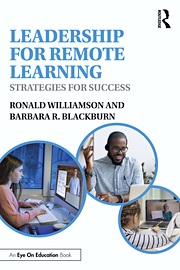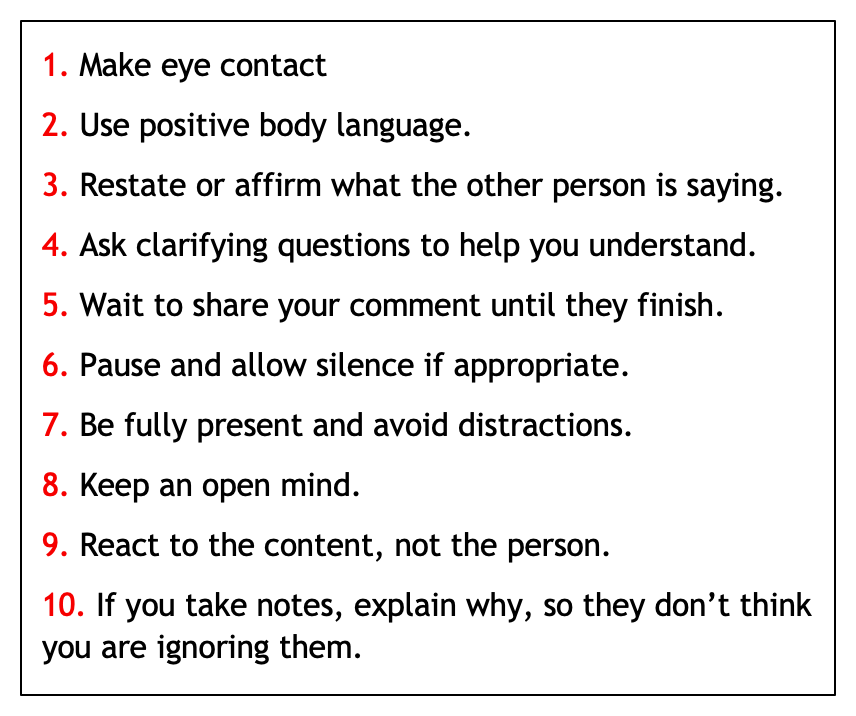Leadership: Listening to Others in Volatile Times
By Ronald Williamson and Barbara R. Blackburn

Ronald Williamson
Listening is a key skill for every school leader, especially when faced by the need to mediate complex and often volatile issues. This fall there were countless stories about school principals being confronted by parents unhappy about pandemic procedures and mask mandates.

Barbara Blackburn
Society today is often sharply divided over many issues. School leaders must often navigate these challenges, and their ability to communicate effectively is essential.
Perhaps the most critical communication skill is active listening – the ability to authentically hear what is said, keep an open mind, and despite differences work together on behalf of students.
We’ve found three principles characterize an effective communicator: focus, openness, and willingness.

5 Barriers to Effective Listening
There are five key barriers to listening, and these are exacerbated when trying to communicate with people who are aggressive or combative or when facing a volatile situation.
Indifference
The first barrier is when we are indifferent to the other person, their issues, or their perspective. For example, in western North Carolina, there was a person, Ms. Bashore, who regularly addressed school board members during meetings. She used a very aggressive, adversarial way of expressing her strong feelings against masks, vaccinations, social distancing, and any other COVID precautions.
Board members generally ignored her and seemed indifferent and dismissive of her comments. This was due to the fact that, although she had previously lived within that school area, she had moved out of the area. However, Ms. Bashore continued to return to meetings to share her views.
Parents and others in the meetings were unaware of the history of the situation, and the behavior of the board members seemed inappropriate and dismissive of their concerns. When board members realized their behavior was influenced other parents, they shifted their body language, and when Ms. Bashore commented, they were more attentive but also made clear that she was not a resident of the district.
Assumptions
Assumptions can also undermine your ability to listen, and therefore communicate. You might assume you already know what a person thinks or how they feel, or assume they have the same background knowledge that you do, or assume they will interpret that knowledge the same way you do.
In one situation a principal became very frustrated with one of his teachers, Mr. Hunter. The principal decided to address equity issues during remote learning by asking teachers to provide an additional layer of instruction for struggling students, which would mean additional planning by teachers, as well as an investment of additional time to connect with those students each week.
Although the principal had worked with teachers to prepare them for such a step, Mr. Hunter had recently transferred in from another school. The principal assumed other teachers shared the information with Mr. Hunter, and that he would be as committed as they were to helping struggling learners.
Unfortunately, Mr. Hunter had not asked any other teachers for information, and he felt like teachers already were overwhelmed and should not be asked to do additional work. A problem emerged when the principal assumed that Mr. Hunter would support the initiative and didn’t listen for and anticipate his concerns.
Distractions
A third obstacle to effective listening is distractions. Distractions include interruptions, multitasking, or anticipating your next comments rather than paying attention to what the speaker is saying.
Barbara experienced this during a recent Zoom meeting. Although the other person had initiated the call, she continually asked participants to wait while she answered her phone, sent a text, or responded to an email. This behavior telegraphed a message that everything else was more important than our call, and ultimately, our time.

In both of these cases, the solution is actually simple. Stop doing anything else and patiently listen to the other person. Focus on the speaker, not your own needs. Share your comments when they have finished sharing theirs.
Hurrying
This actually leads to the fourth obstacle, hurrying the process. This is particularly true if we aren’t interested in the other person or his or her concerns. Oftentimes, we want to hurry the process because we’ve already made up our minds about the urgency of the issue or the resolution.
In one case Dr. Durrell, a middle school principal, was under a mandate from her supervisor to implement a new program designed to improve test scores. She quickly surveyed teachers, purchased the program, and identified an immediate start date. Teachers resisted because they felt as if they were not involved in the decision, knew little about the program and had inadequate professional development.
Since Dr. Durrell was under a deadline from the central office, she quickly held a brief faculty meeting, asked teachers to share their opinions, limiting the time to 2 minutes per person, and then she announced her decision would stand. In this situation, not only did Dr. Durrell rush, she also made it clear she was not interested in teachers’ concerns. Teachers resented the process, did not feel heard, and were not invested in the program’s success.
Information Overload
The final barrier to effective listening is information overload. Sometimes we simply want to get our point across, and we overload the other person with too much, or extraneous, information.
What does this look like? Let’s take a situation with a district leader, Dr. Banks, and a principal, Ms. Sanders.
Ms. Sanders asked to meet to discuss how schools would address possible future COVID outbreaks. She had several questions, as well as ideas for addressing the issue if it arose. As she asked her first question, “Does the district have any guidelines to determine if we need to transition to remote learning?”, Dr. Banks cut her off and said, “Of course we do. Look at this,” at which point he handed her a 10-page document.
A bit taken aback, Ms. Sanders thanked him and then asked, “How will we address teachers’ concerns about planning for transitions?” Dr. Banks launched into a ten minute soliloquy on the ways teachers should already be prepared.
Ms. Sanders then asked a follow-up question, “What is the district plan for preparing parents, and what is our school’s role in that process?” Once again, Dr. Banks handed her a thick packet of material, including an action plan, details, social media postings, and handouts.
By this point, you can imagine that Ms. Sanders had mixed feelings. She appreciated that there were plans, so schools were not left on their own, but she also felt overwhelmed, didn’t have time to review the information, and didn’t know what to ask next. Later that week, she suggested that Dr. Banks prepare a one page fact sheet for each issue, which would allow principals to understand the overview. Then provide the details.
10 Things You Can Do
You probably recognize most or all of these barriers to effective listening and may have experienced them yourself. While you can’t manage the behaviors of others, there are specific steps you can take to improve your listening skills and contribute to effective communication.
Over the past 30 years we’ve talked to thousands of school leaders and identified ten specific skills that will improve your listening. Many of us in leadership roles use some or all of these skills. What is critical is to make them a routine part of our repertoire so that we assure their use in our daily communication, particularly when dealing with a challenging or volatile situation.
 A Final Note
A Final Note
To be an effective school leader and accomplish your goals, it’s important to be an effective listener. Remember to always be open and genuine with others, even those expressing unpleasant or uncomfortable views. Avoid key obstacles and take steps to actively listen and be engaged in the discussion. Don’t dig in your heels. Be responsive and be ready to change and modify when it makes sense to do so.
Also see the Williamson/Blackburn article:
10 Actions Help Navigate Challenge and Dissent







































Timely and much needed article. Thanks to you both for your clear, concise suggestions!